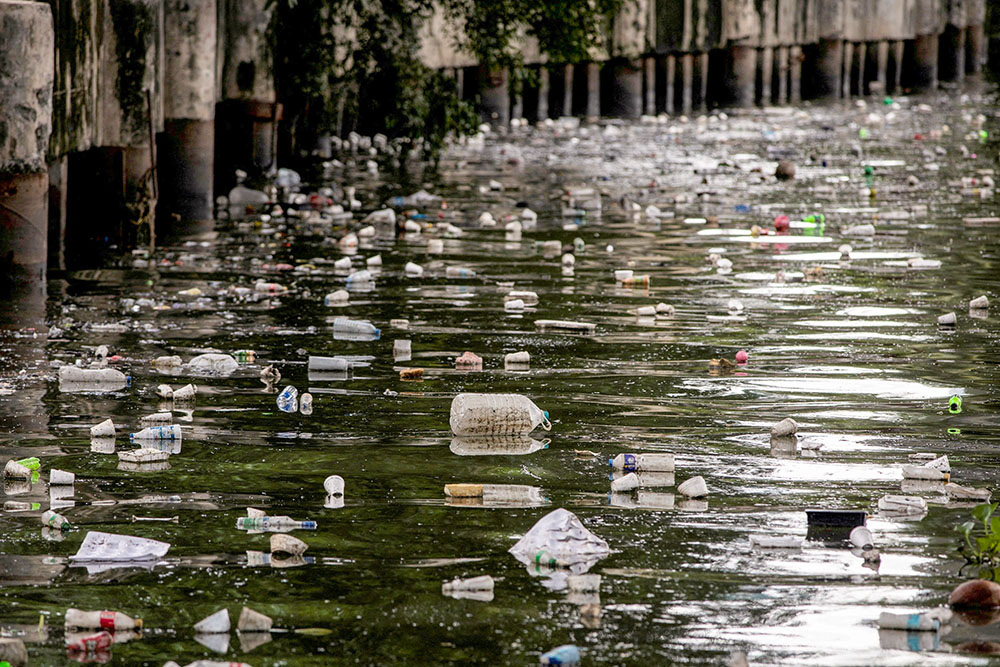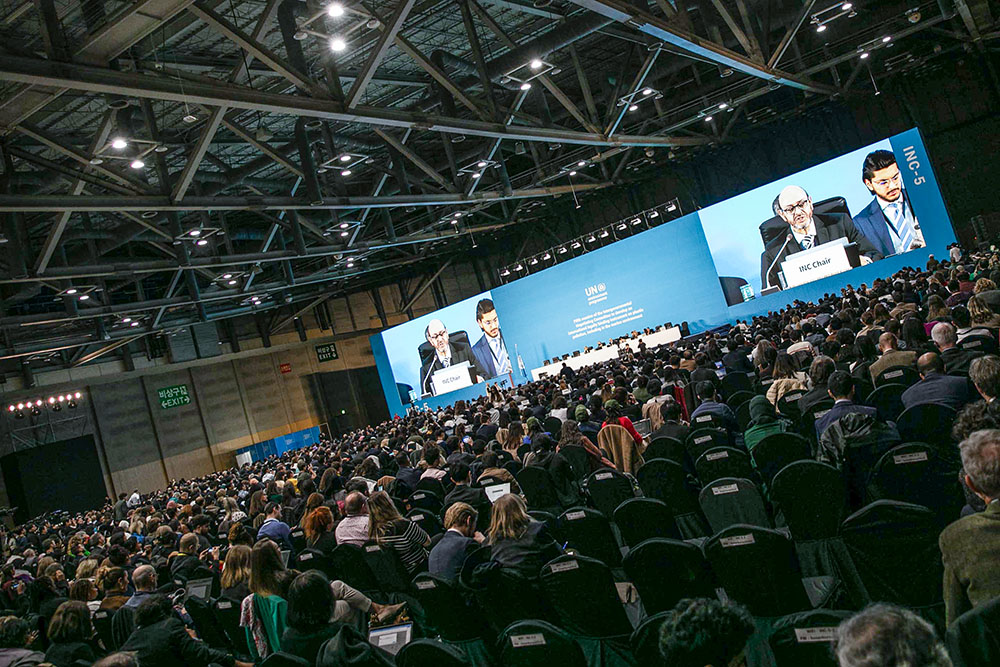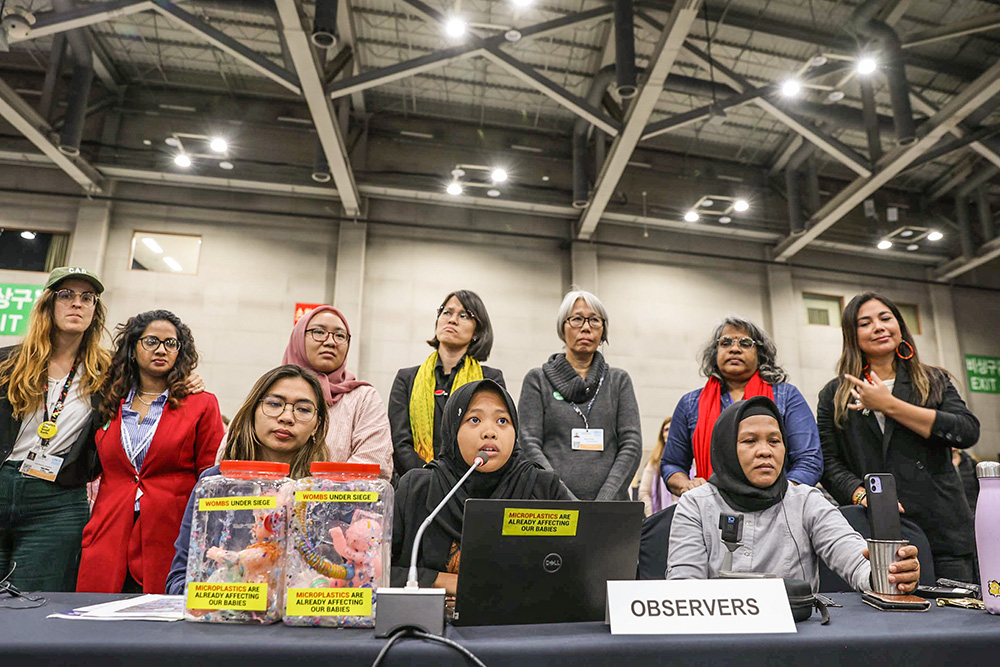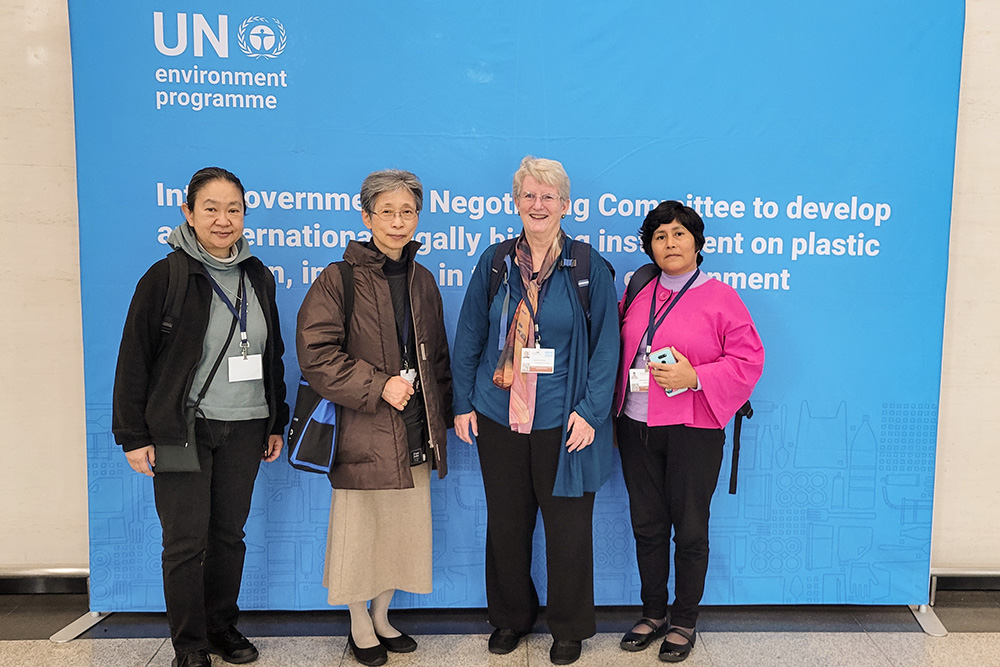
Plastic bottles float on the heavily polluted San Juan River, a tributary of Pasig River in Mandaluyong City, Philippines, June 21, 2021. (OSV News/Reuters/Eloisa Lopez)
Days after talks on a new international treaty to curb plastic pollution collapsed, Sr. Patty Johnson was nonetheless feeling hopeful.
Johnson was in Busan, South Korea, with three fellow Sisters of St. Joseph of Carondelet following the fifth — and expected final — round of United Nations negotiations for a global deal on plastics. In her time there, she attended plenary sessions, reviewed draft texts and conversed with the lead negotiator for the United States.
The session in Busan (Nov. 25-Dec. 1) was expected to deliver a treaty two years in the making, but the meeting adjourned early Dec. 2 with delegates for some 170 nations still deadlocked on key issues. Another round of talks is now expected sometime in 2025.
"Although I'm disappointed that a draft wasn't produced, I'm also encouraged," Johnson told EarthBeat. "I had a general sense that everyone agreed that this is a once-in-a-generation opportunity, and I think everyone agreed that plastic pollution is a global problem. And surprisingly, I heard everyone really wanting an ambitious treaty, although, I'll tell you, they define ambition very differently."
The main fault line among countries concerns plastic production.
More than 100 countries, many part of a high ambition coalition, have called for a legally binding global cap on plastic production — a position endorsed by the St. Joseph sisters, as well as numerous environmental, grassroots organizations and health professionals.

Delegates from 170 countries took part in the fifth round of negotiations on an international treaty addressing plastic pollution in Busan, South Korea. Talks adjourned Dec. 2 without an agreement, with plans to reconvene in 2025. (IISD/ENB/Kiara Worth)
Other nations have rejected that push and instead have pressed for greater management of downstream plastic waste and enhanced recycling methods.
"We have not yet reached the summit of our efforts," Luis Vayas, Ecuador's vice minister of foreign affairs and chair of the plastic negotiations, said at the closing plenary.
It is estimated that nearly 6 billion metric tons of plastic pollute the planet, including 10-12 million metric tons entering the world's oceans each year.
Plastic production has exploded post-World War II, from 2 million tons globally in 1950 to 400 million tons today. That total is projected to double by 2040 and triple by 2060. More than half of all plastic ever created has been produced since 2002. Single-use plastics make up as much as 40% of all present-day plastic production.
Less than 10% of plastic globally has been recycled, and many forms of plastic currently cannot be recycled due the complex blend of chemicals in end products.
The vast majority of plastics — 98% — are created from fossil fuels. Along with contributing 3.7% of global greenhouse gas emissions, plastics have penetrated deeply into ecosystems around the world, clogging waterways, littering beaches and largely ending up in landfills. Microplastics have been found in the air, soil, fish and throughout the human body, including blood, breast milk and the placenta.
More than 10,000 chemicals are used in creating plastics, "many of which are endocrine disruptors, carcinogens, and neurotoxicants," while others' toxicity is unknown, according to a major 2023 report on the wide-ranging health hazards posed across plastic products' entire life cycle.
"A treaty on plastics is really a treaty that's going to protect public health, and a treaty that fails to control plastics is going to be a document that harms public health," said Dr. Philip Landrigan, an epidemiologist and director of the Boston College Global Observatory on Planetary Health who was lead author on the report. "That's why it's so important to get it right."
The 2023 report, published in the Annals of Global Public Health, summarized the impacts of plastics on health. Chemicals that leach out of plastics can cause diseases. When burned, either in landfills or for energy, common in developing countries, toxic substances like benzene and dioxin are released into the air.

Members of the Break Free From Plastic movement address the closing plenary during the U.N.-led fifth round of negotiations on a global plastic pollution treaty in Busan, South Korea, on Dec. 1. (IISD/ENB/Kiara Worth)
Its production also poses high health risks to communities living near oil wells, fracking wells and petrochemical facilities, the majority of whom are people of color and those living below the poverty line. Pregnant women, infants in the womb and young children are among those most vulnerable to negative health impacts from plastics.
"The central point here is that plastic harms health at every stage of its life cycle," Landrigan said.
He told EarthBeat he was "very disappointed" by the outcome in Busan. He said it was essential that an eventual treaty put a cap on plastic production, address the toxic chemicals used in the process — especially "persistent pollutant" polyvinyl chloride — and eliminate single-use plastics.
Jo Banner traveled to Busan to advocate for her home community in southern Louisiana's so-called "Cancer Alley," home to more than 150 petrochemical and industrial facilities. Her organization, The Descendents Project, has called for a strong treaty that addresses the whole life cycle of plastics, including reducing production and regulating harmful chemicals used in the process.
Banner, who is Catholic, said the ways chemicals used in plastic production impact health, including evidence tying exposure to miscarriages and infertility, make the treaty a pro-life issue.
"If there are people out there who care about right to life, they definitely have to look at plastic production and extraction," Banner said.
Banner said she wasn't surprised that a deal wasn't reached, but she is hopeful a treaty will be reached eventually.
"We are being devastated from the health impacts, from the climate impacts, from the weather events that are happening," she said. "So if we don't have immediate help right now, our communities will be just decimated. But it doesn't stop at our fence line. Everybody, everybody's on this fence line."
In March 2022, countries at the fifth U.N. Environment Assembly agreed on a resolution to end plastic pollution, leading to the development of a treaty.
Advertisement
Countries in Busan continued debates from prior negotiating sessions on the contentious question of plastic production. At one point, a delegate for Kuwait stressed "we are not here to end plastic itself ... but plastic pollution." After initially signaling support for a reduction target in the treaty, the U.S. shifted ahead of the Busan meeting to instead prefer nations set voluntary targets, as Grist reported.
Banner, who has joined other grassroots groups engaging the Biden administration around plastic pollution, called it "a big error" for the U.S. not to join the 100-plus countries endorsing a reduction in plastics. She also criticized some countries' efforts to include loopholes for single-use plastics.
While Johnson hoped agreement would emerge in South Korea, the Catholic sister said having no treaty was preferable to "a weak or toothless treaty."
"I am supportive of having one more session, or however many sessions I guess it takes to reach something that will truly address the plastic crisis," she said.
For the Sisters of St. Joseph, their concern with plastics stems partly from their health care ministry, and also has been spurred by Pope Francis' 2015 encyclical "Laudato Si', on Care for Our Common Home." In developing their response to that papal teaching document, under the Vatican's Laudato Si' Action Platform, the sisters explored alternate products to reduce their use of plastics.

Four Sisters of St. Joseph of Carondelet attended the fifth negotiating session for an international treaty on plastic pollution, held in Busan, South Korea. From left, Srs. Chizuru Yamada and Theresa Mitani of Japan, Patty Johnson of the U.S., and Agripina Morales Acosta of Peru. (Courtesy of Patty Johnson)
"It became pretty obvious that although those [steps] are important to our individual ecological conversions, they aren't really going to be at a scale that's going to address the problem," Johnson said. "So when this resolution passed at the U.N. we were right away saying we need to put our energy into focusing on this treaty, because this is a global crisis, and it needs a global solution."
Being in Busan, she added, "allows us to engage in different ways with those who are actually making decisions, and it signals the importance of this topic for us."
In Laudato Si', Francis bemoaned how "the earth, our common home, is beginning to look more and more like an immense pile of filth" and pointed to the ways waste and chemicals pollute lands and waters and harm health.
More recently, Francis has called dumping plastic in the sea a "criminal" action that "kills the Earth." In 2019, the Vatican announced it would end the sale of single-use plastics within its boundaries.
Landrigan said that example is a model other Catholic institutions can follow, and that Catholic hospitals especially have an opportunity to lead in eliminating unnecessary plastics. Ahead of the Busan negotiations, Boston College hosted a conference on the ethics and morality of plastic pollution.
When negotiators reconvene next year, Landrigan, who is also a pediatrician, said it was important they "bear in mind that they're not just dealing with a technical issue of plastic waste on beaches or plastic in the bodies of sea birds and whales.
"They're talking about children's health, and there's a profoundly moral dimension to this, and they have to bear this in mind as they negotiate the treaty."







